How Costa Rica Leverages Collectivism for Economic Growth
Guest Post By: Marleena Eyre, Evening MBA 2023
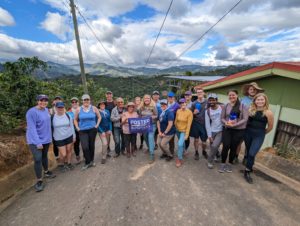
Foster MBA Students with the owners of Café Famu
From Seattle to San José, Costa Rica, culture plays a significant role in how a society operates. Costa Rica’s sustainability brand, Essential Costa Rica, and Pura Vida, or “Pure Life,” cultural expression permeated many experiences on the recent MBA Study Tour to Costa Rica, a ten-day trip across the Central American country’s highlands. From touring coffee farms to a private equity firm to a crafts co-op, our group of 18 students witnessed a shared sense of pride in the country’s cultural roots and how its businesses contribute to its economic growth.
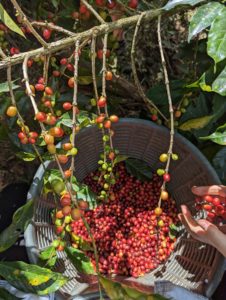
Freshly picked coffee cherries at Cafe Famu
Taking FIN 579: Climate Change and the Capital Markets, taught by Professor Charlie Donovan in Autumn 2022, who co-led the trip with GBC Program Director Angela Shelley, provided a unique perspective going into the short-term study abroad program. I learned that even with the introduction of the 1992 Rio Conference and the 1997 Kyoto Protocol, which urged countries to work together to set carbon emissions limits, results often dissipated due to a lack of accountability. Visiting various businesses enriched my understanding of doing business in Costa Rica. It improved my understanding of sustainability and how other countries outside the United States approach growing environmental and social risks.
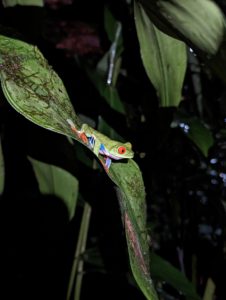
Frog spotted on Arenal Observatory Lodge Twilight Walk
Enjoying San José’s warm weather, we enjoyed an outdoor presentation at Mesoamérica, a private equity firm. For any business, completing a risk analysis assessment for environmental sustainability, fair labor practices, and financial sustainability is essential in protecting its long-term value. Businesses also have a responsibility to continue delivering value to their stakeholders. The Mesoamérica team succeeded in clean energy, circular economy, and nature conservation investments by working collaboratively with Costa Rican business owners and executives. The topic of collaborative business practices was echoed while visiting INCAE Business School for a lecture and lunch, learning about the accomplishments and challenges the country has faced since its independence in 1949.
During our visit to PROCOMER, Costa Rica’s foreign trade promoter, we learned that the government mandated the Essential Costa Rica ecotourism brand, turning the country into a tourist destination while promoting climate change mitigation and adaptation, with 12% of its labor force in the industry. Essential Costa Rica is a certification that local businesses can qualify for, which provides a government sustainability stamp of approval. The brand logo is one of the first and last images travelers see at the San José Juan Santamaría International Airport, setting the stage for how Costa Rica presents itself. The majority of participating businesses are enterprise companies with operational budgets and investments to maintain sustainable practices. However, a portion of certifications belong to small businesses that also benefit from the tourism department’s brand training.
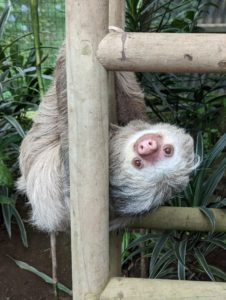
Sloth relaxing at Selvatura Sloth Sanctuary
Before blended finance, a concept combining private and public capital, for-profit businesses may have forgone climate investing due to a lack of available resources. We saw that enterprise coffee farms like Starbucks’ Hacienda Alsacia farm had the financial backing to practice extensive R&D to optimize arabica crop yield based on genetically modified coffee plants, thus reducing inefficient production and increasing high-revenue generating coffee plants. Starbucks outfitted some of its buildings with solar panels and used machinery that reduced water use when cleaning coffee throughout processing.
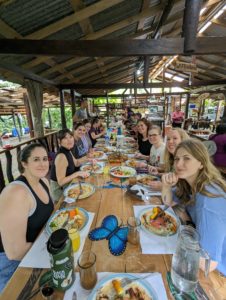
Lunch at Pierella Garden, a butterfly farm
Between hikes at Arenal National Park and Selvatura Park, where we saw sloths in the wild and in protected sanctuaries, my favorite aspect of the program was meeting the business owners and representatives, allowing me to see their impact on their organizations. On our way to Arenal, we visited a local butterfly farm, converted 25 years ago from a mono-crop farm to increase profits through ecotourism, international butterfly sales, cacao production, and reverse pest damage, soil health degradation, and progressive crop loss. As we walked through the biodiverse farm and heard how it was created by introducing just one butterfly species, I learned that the catalyst for mitigating climate change does not always have to be monumental but can start from a small idea that grows over time, nurtured in a collectivist country like Costa Rica. This was the throughline for many company visits and experiences throughout the study tour. A sustainable idea can be metaphorically planted to grow over time and be impactful when supported by the right capabilities. There are now over 400 butterfly farms across Costa Rica.
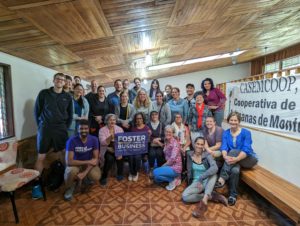
Meeting CASEM founding team of artisans
Our visit to Cooperative of Artisans Santa Elena of Monteverde (CASEM), a women-owned and run crafts cooperative in Monteverde, allowed our class to hear the stories of the co-op’s most seasoned members. For many of the women at CASEM, producing and selling their artwork meant earning money for themselves and their families for the first time in their lives. It was a life-changing experience and empowered their co-op community to grow. Over the past three decades, CASEM has seen a decline in younger artisans as they move to cities for better career opportunities. A similar shift is happening with small coffee farms throughout Costa Rica, where local farm owners have become more reliant on migrant coffee pickers. Many coffee pickers travel south to Costa Rica from Nicaragua seeking work and thus export their GNP contributions abroad.
As a Global Business Program Certificate candidate in the MBA program, the study tour to Costa Rica provided unique experiences for visiting businesses abroad, some of which most tourists would not be able to participate in. I’ll have fond memories of traveling with my classmates, our UW Foster faculty, GBC Program Director, and Costa Rican travel guide as we learned about the country’s ecotourism sector and how it ties to sustainability, understanding how interconnected the economy is to tourism, entrepreneurship, agriculture, international trade, and other sectors. The company hosts were generous with their time and shared their experiences with our class, allowing for thoughtful discussions. The GBC offers various short-term study abroad trips, presenting an opportunity to learn about business and culture through a different lens outside the classroom. I plan to travel back to Costa Rica and visit the Caribbean and Pacific coasts to build off my recent experience and encourage MBA students to join a future study tour or two.

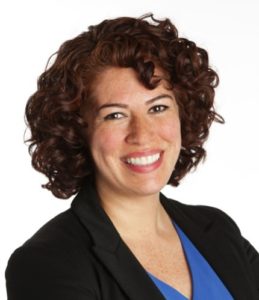 Marleena Eyre is a Sales Analytics Intern on the Amazon, Best Buy, and Ingram Micro accounts at Signify (formerly Philips Lighting) and an MBA candidate at the University of Washington’s Michael G. Foster School of Business, graduating in June 2023. Her background is in marketing, sales, and PR. Prior to her MBA program, she used her MLA in Gastronomy Communications experience from Boston University to launch restaurants in Boston and New York City. Coming from a multicultural family and traveling from a young age anchored her decision to major in International Studies and Geography at University of Miami and ultimately pursue Global Business at UW Foster, where she is also completing its Global Business Certificate. When not in class, she enjoys making and selling ceramics, finding new coffee shops, and playing the occasional tennis match.
Marleena Eyre is a Sales Analytics Intern on the Amazon, Best Buy, and Ingram Micro accounts at Signify (formerly Philips Lighting) and an MBA candidate at the University of Washington’s Michael G. Foster School of Business, graduating in June 2023. Her background is in marketing, sales, and PR. Prior to her MBA program, she used her MLA in Gastronomy Communications experience from Boston University to launch restaurants in Boston and New York City. Coming from a multicultural family and traveling from a young age anchored her decision to major in International Studies and Geography at University of Miami and ultimately pursue Global Business at UW Foster, where she is also completing its Global Business Certificate. When not in class, she enjoys making and selling ceramics, finding new coffee shops, and playing the occasional tennis match.